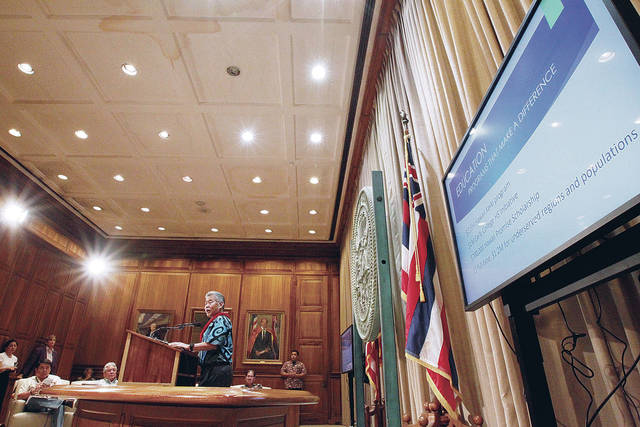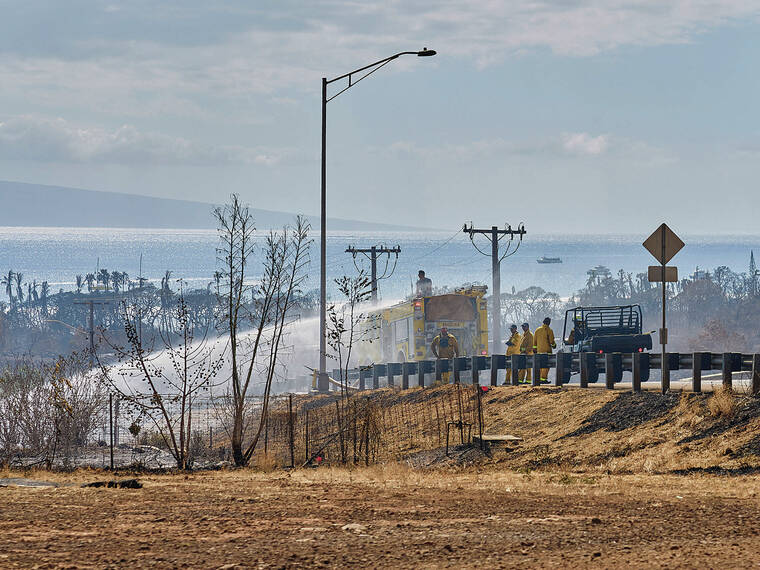Ige’s budget proposal would boost state’s spending by $85M

JAMM AQUINO / JAQUINO@STARADVERTISER.COM
Gov. David Ige spoke at the state Capitol during a news conference Monday to outline his supplemental budget.
Gov. David Ige presented his latest budget proposal Monday, announcing a package that increases state spending next year by $85.5 million to a total of nearly $14.4 billion.
The administration also proposed a separate construction budget of nearly $1.5 billion for next year. More than half of that, or $844 million, would go for transportation, including highways, airports and harbors.
Ige predicted the extra construction spending will have a “broad economic impact” on the state by supporting about 14,000 jobs, including 5,520 in the construction industry.
The governor is heading into a tough Democratic primary next year in which he is being challenged by U.S. Rep. Colleen Hanabusa, and housing, homelessness and the economy will likely be leading campaign issues.
Ige is proposing to increase state spending to cope with homelessness, including an extra $6 million to continue the state’s Housing First and Rapid Re-Housing programs for the homeless, and $5 million for property storage and trash removal for sweeps of homeless camps.
Ige is also asking lawmakers for authority to spend another $419,000 for eight additional state deputy sheriffs to run homeless operations and sweeps, and is seeking $800,000 for outreach and counseling for chronically homeless people and families with “severe substance abuse disorders.”
Don't miss out on what's happening!
Stay in touch with breaking news, as it happens, conveniently in your email inbox. It's FREE!
A spokeswoman for the governor’s office said the state Department of Human Services is spending nearly $31 million on homeless programs this fiscal year, but that does not include state spending on enforcement efforts or homeless programs run by the state Department of Health.
The governor’s proposed budget also includes more than $24 million in “strategic investments” in the Department of Education. The add-ons would increase the department’s general-fund budget by less than 1 percent to $1.99 billion for next year.
“This budget clearly reflects our priority for public education here in the state,” Ige said.
Benefits for schools
The governor wants to boost per-pupil funding for public schools by $2 million through what’s known as the weighted student formula. The Board of Education had wanted a $10 million increase to the per-pupil funding method, which assigns “weights” to various student characteristics to help ensure funds go to schools with the greatest needs.
Ige also wants $1 million to expand the Early College program, which provides public school students an opportunity to earn college credit for free while satisfying high school diploma requirements. He’s also proposing a $2.8 million increase for the Hawaii Keiki school-based health services program.
For school facilities, Ige is proposing $150 million for DOE campus improvements statewide, including $60 million for the planned Pohukaina Elementary School in Kakaako. He did not include a request from the state Public Charter School Commission for $6.2 million to help with charter school facilities.
In higher education, Ige wants to put $700,000 toward the Hawaii Promise scholarship program that aims to provide a free community college education for needy University of Hawaii students.
The program, which launched earlier this year, is designed as a so-called last-dollar scholarship that kicks in after all other federal grants and private aid are exhausted. It was expected to help cover tuition costs for nearly 1,000 students this fall.
Overall, Ige is proposing to spend about $175 million more from the general treasury than it will collect in taxes and other revenues in the year that begins July 1. His spending plan would leave the state with a general fund cash balance of nearly $655 million when the next fiscal year ends June 30, 2019.
That cash balance is a significant reduction from the $894 million the state had on hand when it closed the books on the last fiscal year June 30. However, it is comparable to the cash balance the state had on hand the year Ige entered office as governor, when the state closed out fiscal 2014 with a general treasury balance of $664 million.
Ige has submitted his proposed supplemental budget to the state Legislature, which will make amendments to his proposal during the regular session that begins Jan. 17.
Star-Advertiser reporter Nanea Kalani contributed to this report.




